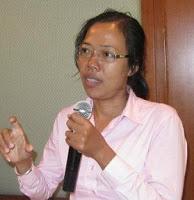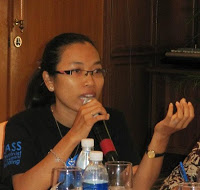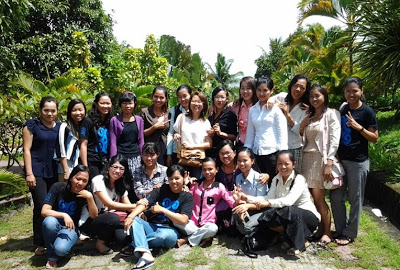



 In June 2008, JASS widened its movement-building institute in Southeast Asia, in line with its multiregional capacity-building initiative. This initiative, led by Indonesian activists Nani Zulminarni and Dina Lumbantobing, aimed at strengthening women’s leaderships and movements in Southeast Asia.
In June 2008, JASS widened its movement-building institute in Southeast Asia, in line with its multiregional capacity-building initiative. This initiative, led by Indonesian activists Nani Zulminarni and Dina Lumbantobing, aimed at strengthening women’s leaderships and movements in Southeast Asia.
This regional event has inspired two young women activists of Cambodia to organize their ranks after they have learned more about feminism, women’s rights, and the history of women’s movements in Southeast Asia. They also shared their personal stories of struggle with other women activists in the region.
These two young women are Kunthea Chan, then of Committee to Promote Women in Politics, and Vanna Chey of Star Kampuchea. A year after the regional workshop, they helped organize the first of a series of Cambodia’s movement-building institutes (MBIs). The first Cambodian MBI was a national level leadership training of women that aimed to address the underrepresentation of women’s voices and issues in Cambodian society. The JASS feminist popular education methods in the JASS SEA regional workshop were used in the MBI and the JASS concepts became the framework of analysis of the Cambodian women’s context.
It was in this MBI that the groundbreaking formation of a young women’s alliance – the Cambodian Young Women’s Empowerment Network (CYWEN), took place a year later.
CYWEN’s vision is the empowerment of women to increase their participation in society. It aims to build the confidence of young women by providing them the opportunity and encouragement to learn for their own needs. CYWEN also aims to assist in pushing other young women in acquiring knowledge, skills, and experiences from society, and to provide opportunities in showing effectively their abilities in social affairs.
“JASS has both direct and indirect influence on CYWEN,” admits Kunthea Chan, the first CYWEN chairperson and currently, JASS Southeast Asia’s program coordinator. Initially, Kunthea, who helped in setting up CYWEN, envisioned “to apply the knowledge I get from JASS and share it to our Cambodian young women.”
Kunthea adds, “I feel that they should know all the useful information and knowledge. I also would like them to get more opportunities to learn and share the experiences as I did so that we can help each other to change our society.”
 Sophoan Chan, the new CYWEN chair, relates,” CYWEN started as a very informal group with members who are personal contacts. During the discussion with the team in 2010, we have analyzed about the challenges and the opportunities facing Cambodian youth, especially young women. We started with a vision to increase the young women’s resource in Cambodia.”
Sophoan Chan, the new CYWEN chair, relates,” CYWEN started as a very informal group with members who are personal contacts. During the discussion with the team in 2010, we have analyzed about the challenges and the opportunities facing Cambodian youth, especially young women. We started with a vision to increase the young women’s resource in Cambodia.”
Since CYWEN started, activities such as capacity building, networking (regular meeting and social media), team building, mass media advocacy through radio and newspapers, and public dialogue (16 days of activism campaign) have already been conducted.
Indeed, CYWEN is ready to break all the barriers facing women activists and feminists in the country. Admittedly, the lack of safe spaces for women is one of the hurdles in organizing women in Cambodia. According to Sophoan, women do not feel safe to participate in the movement. She adds, “In Cambodia, it is not secure for people who are activists to strongly challenge the government.”
Another challenge that CYWEN faces is the hesitation of young women to participate in the movement and in politics. As Sophoan points out, “The reason that they do not want to participate is they lack confidence, capacity, and opportunity.”
In addressing all these barriers, JASS and CYWEN have a lot of things to work on in the future. Apart from its instrumental role in the conception of CYWEN, JASS can and continues to provide more skill-building and capacity-building trainings.
Sophoan adds, “CYWEN needs to have a global strategy to strengthen young women in the region and then we will have the same voice, the same vision, and the same activity as our JASS SEA sisters. This will bring stronger voice for women.”
 “CYWEN’s role is very important to the feminist movement in Cambodia because it will mobilize young women as a network all over the country. We will try to mobilize all young women to come together to work on common interests. Working together also builds young women’s confidence to join in changing society’s perceptions on women and to increase women’s participation in decision-making,” concludes Sophoan.
“CYWEN’s role is very important to the feminist movement in Cambodia because it will mobilize young women as a network all over the country. We will try to mobilize all young women to come together to work on common interests. Working together also builds young women’s confidence to join in changing society’s perceptions on women and to increase women’s participation in decision-making,” concludes Sophoan.
JASS is truly committed to building the voice, visibility, and collective organizing power of women and CYWEN is a living testament to this commitment. CYWEN is soaring to greater heights as it shapes the seeds of the feminist movement in Cambodia.